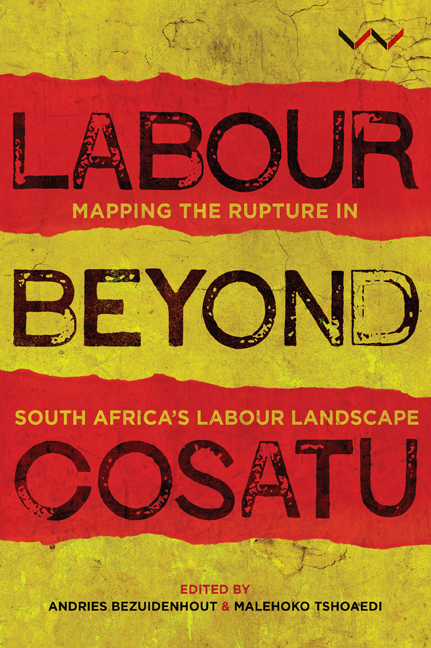Book contents
- Frontmatter
- Contents
- Figures and Tables
- Abbreviations and Acronyms
- Preface
- Chapter 1 Democracy and the Rupture in South Africa's Labour Landscape
- Chapter 2 Research in a Highly Charged Environment: Taking Democracy Seriously, 2014
- Chapter 3 The Social Character of Labour Politics
- Chapter 4 Is Cosatu Still a Working-Class Movement?
- Chapter 5 Labour Aristocracy or Marginal Labour Elite? Cosatu members' income, other sources of livelihood and household support
- Chapter 6 The Politics of Alliance and the 2014 Elections
- Chapter 7 Cosatu, Service Delivery, Civil Society and the Politics of Community
- Chapter 8 The Politics of Male Power and Privilege in Trade Unions: Understanding sexual harassment in Cosatu
- Chapter 9 Internal Democracy in Cosatu: Achievements and challenges
- Chapter 10 Public Sector Unions in Cosatu
- Chapter 11 Are Cosatu's Public Sector Unions Too Powerful?
- Chapter 12 Labour Beyond Cosatu, Other Federations and Independent Unions
- Contributors
- Index
Chapter 3 - The Social Character of Labour Politics
Published online by Cambridge University Press: 21 March 2018
- Frontmatter
- Contents
- Figures and Tables
- Abbreviations and Acronyms
- Preface
- Chapter 1 Democracy and the Rupture in South Africa's Labour Landscape
- Chapter 2 Research in a Highly Charged Environment: Taking Democracy Seriously, 2014
- Chapter 3 The Social Character of Labour Politics
- Chapter 4 Is Cosatu Still a Working-Class Movement?
- Chapter 5 Labour Aristocracy or Marginal Labour Elite? Cosatu members' income, other sources of livelihood and household support
- Chapter 6 The Politics of Alliance and the 2014 Elections
- Chapter 7 Cosatu, Service Delivery, Civil Society and the Politics of Community
- Chapter 8 The Politics of Male Power and Privilege in Trade Unions: Understanding sexual harassment in Cosatu
- Chapter 9 Internal Democracy in Cosatu: Achievements and challenges
- Chapter 10 Public Sector Unions in Cosatu
- Chapter 11 Are Cosatu's Public Sector Unions Too Powerful?
- Chapter 12 Labour Beyond Cosatu, Other Federations and Independent Unions
- Contributors
- Index
Summary
THE ANC'S WANING HEGEMONY IN COSATU
The vital comradeships of class and nation shared by trade union members and shop stewards during the 1990s and the early 2000s (Sitas 2010) have been on the wane. Past Taking Democracy Seriously surveys, conducted from 1994 to 2004, showed how workplace democracy on the one hand and a commitment to the Alliance and support for the ANC on the other defined the character and political consciousness of the membership of Cosatu. For example, 75 per cent of members interviewed in 1994 expressed the intention to vote for the ANC, and 83 per cent and 84 per cent respectively supported the existence of the Alliance between the ANC, the SACP and Cosatu, and supported its continuance (Ginsburg et al. 1995).
Such quantitative measures dovetailed well with more qualitative work that enunciated forms of consciousness that blended class analysis and nationalism: the national idea spoke of a black nation, the producer of all wealth and values, exploited by white capitalists in the workplace (Sitas 2010); and, despite critical comment of Cosatu's shift from ‘social movement unionism’ towards a ‘strategic unionism’ (Von Holdt 2002) or a politics of ‘cooperative alterity’ and the adoption of a language that placed the ANC as the leading and hegemonic force in South Africa's National Democratic Revolution, workers and shop stewards expressed unreserved support for such a post-1994 politics. To put it bluntly: between 1994 to 2004, the ANC was hegemonic. Period.
But as our continuous monitoring of all this has demonstrated, by 2014 such a hegemony has been receding.
Similarly, support for the Alliance has been receding.
In the volatile current environment it is appropriate to note that alongside this trend an increasing number of respondents would prefer that Cosatu is not aligned to any political formation or party. They constituted a bloc of 15 per cent of respondents in 1994; by 2014 this had doubled to 30 per cent. Furthermore, the call that Cosatu should abandon the Alliance and form its own political party was supported by 3 per cent of the 1994 respondents and 8 per cent of the 2014. The latest figure is at odds with a recent survey conducted by Case (2013), which found that such support would be six times our estimate.
- Type
- Chapter
- Information
- Labour Beyond CosatuMapping the Rupture in South Africa's Labour Landscape, pp. 37 - 47Publisher: Wits University PressPrint publication year: 2017



